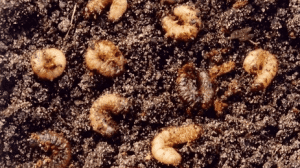Nematodes are microscopic colorless predatory worms that occur naturally in the soil. Beneficial nematodes hunt down and kill pest insects. They enter insect larvae through small openings on the body and release bacteria that attack the pest from inside, sterilizing it until it dies.
Beneficial nematodes pose no threat to humans, pets, plants, or beneficial insects. They’re therefore used as a non-chemical solution to get rid of grubs and other soil-dwelling destructive insects. Nematodes come in a variety of types for targeting specific species of pests.
Nematodes for Grubs
Heterorhabditis bacteriophora (Hb) nematodes are the most effective against Japanese beetles, European chafers, and other grubs found in lawns. These cruiser nematodes burrow deep down in the soil as they hunt for pests. They also easily get into the body of the pest thus known for faster elimination of grubs.
Beneficial nematodes are shipped while in the infectious juvenile stage of their life cycle, and you may receive them on a sponge, in liquids, or in gels. Nematodes are best applied as soon as possible but they can also be stored in the refrigerator for up to 2 – 3 weeks. Prolonged freezing is not recommended, as it can harm them.
The amount of nematodes to use depends on the severity of grub infestation and the size of your yard. Usually, 1 million nematodes are mixed with water to treat a 2000 sq. ft. lawn area.
For complete coverage and elimination of pests, several applications should be done every 7-10 days or until infestation subsides.
When to apply beneficial Nematodes
Like chemical grubs control, proper timing is required for an effective application of beneficial nematodes. Nematodes should be applied when grubs are actively feeding. In summer, apply nematodes in mid to late August, and in spring apply when soils start to warm.
The application of nematodes for grubs should be done in the morning before the sun gets brighter – strong sunlight harm nematodes. Above 35°C (95°F), nematodes will die and all your effort will be futile.
These microscopic worms also like a moist environment, irrigate dry soil before application or do it after a downpour.
During winter grubs hibernate to overwinter and they are usually not active. A few or none of the nematodes applied will also be active during this period. Few that may survive the frost will not be effective enough to tackle the overwintered grubs in spring.
How to apply Beneficial Nematodes

Nematodes are usually mixed with water for faster and easier application. The solution can then be applied using a watering can, a pump sprayer, a hose end Sprayer, or through an irrigation system.
What to do:
- Carefully read and follow the label and mixing instructions.
- Pour your prepared nematode solution into your preferred sprayer.
- Immediately spread the solution over the area to be treated.
- Keep shaking your sprayer tank to prevent the nematodes from sinking to the bottom until you finish spraying.
- After application apply 1/4 inch of water to help wash off the nematodes from grass blades
- Keep your lawn moist for up to two weeks so that nematodes can get established into the soil – water every 3-4 days if rainfall does not occur.
How long does it take nematodes to kill grubs?
It will take up to two weeks after the application of nematodes to realize a noticeable change in the grub population. Nematodes take time to attack and kill their host before moving to the next one.
Do not expect to see dead grubs, the process happens from the inside of the pest. Infected grubs take on a brown appearance.
The bacterial attack on larvae interferes with the complete life cycle of grubs and within some time, the adult population will start declining. Re-application of the nematodes after every two weeks will completely wipe out grubs in your lawn.
Where to buy nematodes
Nematodes can be ordered from any organic pest control agency or an online gardening store. The price varies among suppliers and the entire cost will depend on application rates for your area.
Final Thought
Nematodes have consistently demonstrated effectiveness in controlling pests in various agricultural and horticultural sectors. Being biological control agents, nematodes require specific conditions to be effective including good storage, timely application, and re-applications.
References
- Scotts: How to Control Grubs
- Maine Gov: Using Beneficial Nematodes for Grub Control
- New York State Integrated Pest Management Program: Nematodes for White Grubs